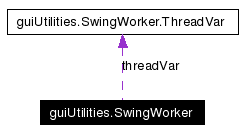
Collaboration diagram for guiUtilities.SwingWorker:

Public Member Functions | |
| abstract Object | construct () |
Compute the value to be returned by the get method. | |
| void | finished () |
Called on the event dispatching thread (not on the worker thread) after the construct method has returned. | |
| void | interrupt () |
| A new method that interrupts the worker thread. | |
| Object | get () |
Return the value created by the construct method. | |
| SwingWorker () | |
Start a thread that will call the construct method and then exit. | |
| void | start () |
| Start the worker thread. | |
Protected Member Functions | |
| synchronized Object | getValue () |
| Get the value produced by the worker thread, or null if it hasn't been constructed yet. | |
Private Member Functions | |
| synchronized void | setValue (Object x) |
| Set the value produced by worker thread. | |
Private Attributes | |
| Object | value |
| ThreadVar | threadVar |
Classes | |
| class | ThreadVar |
| Class to maintain reference to current worker thread under separate synchronization control. More... | |
For instructions on and examples of using this class, see:
http://java.sun.com/docs/books/tutorial/uiswing/misc/threads.html
Note that the API changed slightly in the 3rd version: You must now invoke start() on the SwingWorker after creating it.
Definition at line 16 of file SwingWorker.java.
|
|
Return the value created by the Returns null if either the constructing thread or the current thread was interrupted before a value was produced.
Definition at line 78 of file SwingWorker.java. References guiUtilities.SwingWorker.ThreadVar.get(), guiUtilities.SwingWorker.getValue(), and guiUtilities.SwingWorker.threadVar. Here is the call graph for this function:  |
|
|
A new method that interrupts the worker thread. Call this method to force the worker to stop what it's doing. Definition at line 63 of file SwingWorker.java. References guiUtilities.SwingWorker.ThreadVar.clear(), guiUtilities.SwingWorker.ThreadVar.get(), and guiUtilities.SwingWorker.threadVar. Here is the call graph for this function:  |
 1.4.6
1.4.6